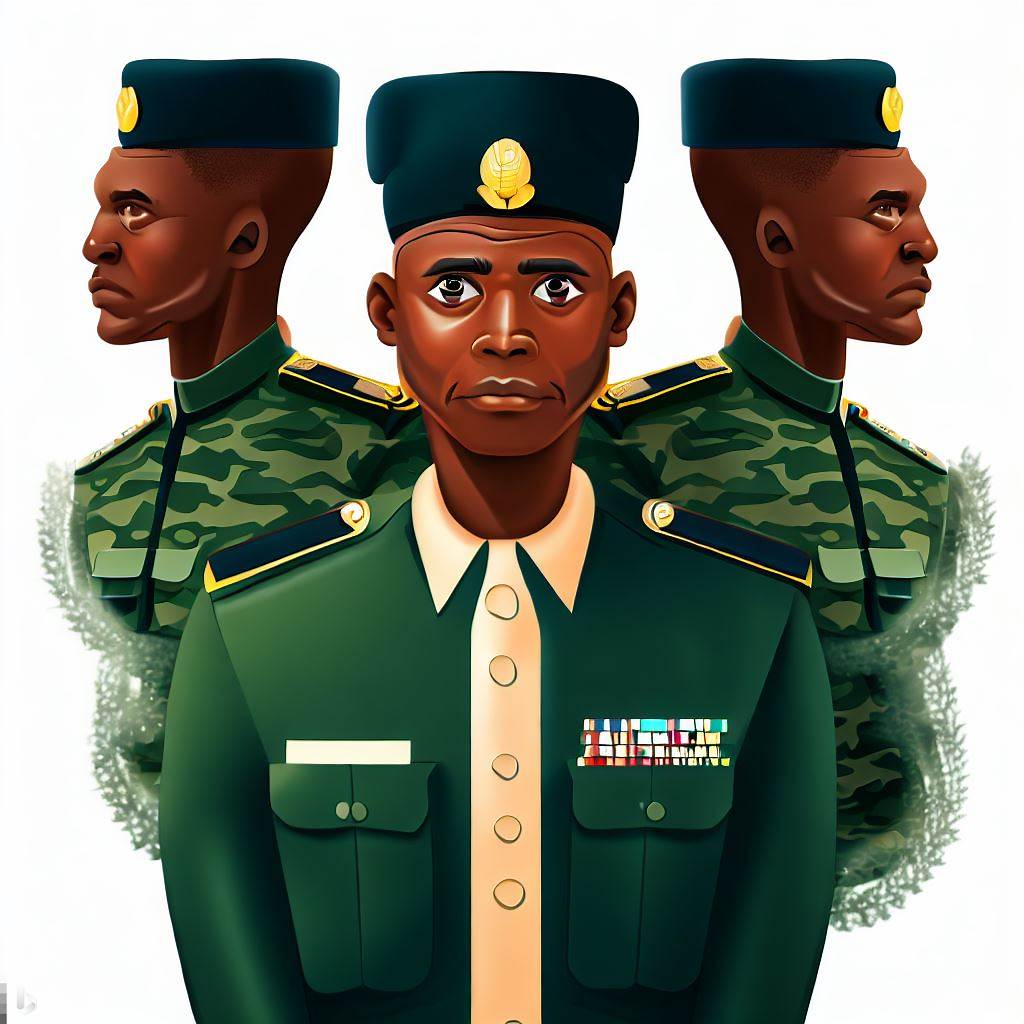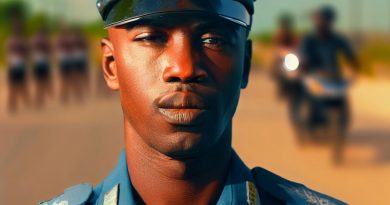Nigeria’s Military: Service Branches Explained
Last Updated on July 26, 2023
Introduction
Nigeria is a country situated in West Africa with a population of over 200 million. The Nigerian military is one of the largest and most powerful on the continent. Amidst its diverse cultural heritage and vast natural resources, Nigeria’s military stands tall as one of the largest and most formidable defense forces in Africa.
With a rich history dating back to its independence in 1960, the Nigerian military has played a significant role in safeguarding the nation’s sovereignty and territorial integrity. Over the decades, it has evolved and expanded to meet the ever-changing security challenges within the region and beyond.
In this comprehensive article, we delve into the intricacies of Nigeria’s military service branches, unraveling the distinct roles and responsibilities each one undertakes.
From defending the nation against external threats to conducting vital peacekeeping operations, understanding the different facets of Nigeria’s military is paramount to grasp the dynamic landscape of security and peacekeeping in this diverse nation.
Throughout the article, we will explore the Army, the Navy, the Air Force, and other crucial branches that form the backbone of Nigeria’s defense structure. Moreover, we will shed light on their training, equipment, and the joint efforts that ensure seamless coordination among the various branches.
The Nigerian Army
The Nigerian Army has over 100,000 troops organized into divisions and brigades across the country. Its roles include protecting territorial integrity, maintaining internal security, and aiding during national emergencies.
Additionally, the army participates in peacekeeping missions globally, like Liberia and Sierra Leone. In recent years, the military achieved significant operations, including successfully repelling Boko Haram terrorists in the northeast during “Operation Lafiya Dole” in 2015.
Essentially, they play a vital role in the country’s military, responsible for preserving peace and security. Understanding its history, organization, roles, and responsibilities can help appreciate its contributions to the country’s security.
Read: Government and Military in Nigeria: A Symbiotic Relationship
Nigeria’s Navy
The Nigerian Navy is one of the branches of the Nigerian Armed Forces, established in 1956 as a maritime component of the Royal West African Frontier Force. It is responsible for protecting Nigeria’s territorial waters and maritime interests. Below are some important facts about the Nigerian Navy:
History of the Nigerian Navy
As we explore the different branches of Nigeria’s military, an in-depth understanding of the Nigerian Navy’s history and evolution is vital. It allows us to appreciate the vital contribution to maintaining stability, prosperity, and maritime security in the region.
The Nigerian Navy was officially established on June 1, 1956, as a successor to the Nigerian Marine, which was formed after World War II. Before Nigeria gained independence in 1960, the Navy was known as the Royal Nigerian Navy and served as a branch of the British Royal Navy.
The Nigerian Navy has since undergone various transformations and restructuring to better fulfill its roles and responsibilities.
With a renewed focus on safeguarding Nigeria’s extensive coastline, territorial waters, and offshore assets, the Nigerian Navy has been resolute in combating various maritime security threats, such as piracy, illegal fishing, and trafficking.
Over time, the Nigerian Navy has demonstrated its commitment to regional peacekeeping efforts, actively participating in multinational operations in collaboration with neighboring countries and international partners.
It has also contributed to humanitarian missions, disaster relief, and search-and-rescue operations, reflecting its dedication to both national and global security concerns.
Fleet Composition and Organization
The Nigerian Navy operates a fleet of 140+ vessels, including frigates, corvettes, patrol boats, and amphibious assault ships. It consists of three operational commands: the Western Naval Command, the Eastern Naval Command, and the Central Naval Command.
Additionally, the Nigerian Navy operates several training institutions. These include the Nigerian Naval College, Nigerian Naval Engineering College, and Nigerian Navy Basic Training School.
Roles and Responsibilities of the Navy
- The primary role of the Nigerian Navy is to protect the nation’s territorial waters, including offshore resources and fishery grounds.
- The Navy also plays a significant role in enforcing maritime laws, preventing piracy and smuggling, and conducting search and rescue operations.
- The Nigerian Navy participates in international peacekeeping missions and collaborations with other maritime organizations.
Recent Operations and Challenges Faced by the Navy
The Nigerian Navy has been involved in several operations in recent years, including anti-piracy and anti-smuggling operations in the Gulf of Guinea. In 2016, the Navy launched “Operation Tsare Teku,” aimed at combating the activities of sea robbers and pirates in the country’s coastlines.
Despite its efforts, the Nigerian Navy faces significant challenges, such as inadequate funding, outdated equipment, and corruption within its ranks.
In essence, the Nigerian Navy plays a crucial role in safeguarding Nigeria’s maritime interests. The Navy, despite challenges, remains dedicated to fulfilling responsibilities and enhancing capabilities for better national service.
Read: Retirement in the Nigerian Military: What to Expect
Nigeria’s Air Force
The Nigerian Air Force (NAF) established on April 18, 1964, stands as one of Africa’s largest air forces. It primarily defends Nigerian airspace and supports ground forces through air operations.
History of the Nigerian Air Force
The Nigerian Air Force (NAF)was established with the assistance of the British government, which provided training and equipment. As a complement to the Nigerian Army and Navy, it rapidly evolved into a formidable regional force.
During its early years, the NAF played a pivotal role in supporting Nigeria’s military interventions in Congo and Tanzania, showcasing its capabilities and dedication to regional peace and stability. Subsequently, the Air Force actively participated in vital peacekeeping missions in Liberia, Sierra Leone, and Sudan.
Adapting to the ever-changing landscape, the NAF has consistently modernized its aerial fleet, bolstering its reconnaissance, air patrol, and combat capabilities.
Moreover, the NAF’s role extends to internal security, providing critical air support in counterinsurgency efforts against extremist groups. Safeguarding Nigerian airspace and supporting ground forces remain central to its mission.
Aircraft Inventory and Organization
The NAF has a diverse fleet of aircraft, including fighter jets, transport planes, helicopter gunships, and surveillance drones. Its aircraft are organized into nine squadrons, each with a specific operational focus, such as air defense, ground attack, or air transport.
Roles and Responsibilities of the Air Force
The primary role of the NAF is to protect Nigerian airspace and provide air support to ground forces. It also has a secondary role in providing transport and logistics support to other government agencies, such as the police and immigration service.
In addition, the NAF is responsible for search and rescue operations, disaster relief, and humanitarian aid.
Notable Achievements and Challenges Faced by the Air Force
NAF aircraft offered crucial air support to ground troops, and their peacekeeping efforts earned recognition for courage and professionalism.
However, the NAF encountered challenges like inadequate funding for equipment maintenance and modernization, as well as internal corruption.
The Nigerian Air Force defends and secures Nigeria significantly. Despite funding and corruption issues, it displays professionalism and commitment to protecting Nigerian sovereignty. With ongoing investment and support, the NAF can evolve into one of Africa’s most capable air forces.
Read: A Guide to Understanding the Political Landscape of Nigeria

Joint service operations
In Nigeria, joint service operations involve the collaboration of different branches of the military to achieve a common goal. Examples of successful joint operations include the capture of Boko Haram leaders and the containment of militancy in the Niger Delta region.
Joint operations allow for the pooling of resources, skills and expertise to tackle complex security challenges. However, the coordination of different units can be difficult, and communication breakdowns can occur.
Adequate training and communication protocols are necessary to ensure the success of joint operations.
Read: Promotion Structure within the Nigerian Military
Conclusion
As Nigeria looks to the future, plans and investments in military capabilities are necessary to ensure the country’s security. The Nigerian military faces many challenges and areas for improvement, including issues with corruption and inadequate funding.
However, maintaining a strong and capable military is crucial for Nigeria’s national security, as well as contributing to regional stability in West Africa. The military plays a key role in combating terrorism, protecting the nation’s borders, and responding to humanitarian crises.
To improve the military’s capabilities, investments are needed in modern equipment and training for personnel. Additionally, efforts to address corruption and improve accountability within the military are critical to its success.
It is important to understand the different branches of Nigeria’s military, their strengths and weaknesses, and how they work together to protect the nation. The Nigerian Army, Navy, and Air Force each have distinct roles and responsibilities, and coordination between the branches is necessary for effective operations.
Overall, Nigeria has the potential to build a highly capable military that can contribute to regional security and stability. With strategic investments and reforms, the military can continue to protect the Nigerian people and promote peace in the region.


